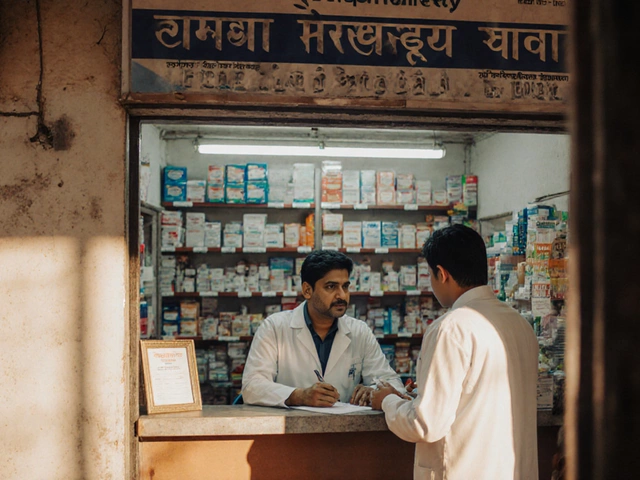Living with diabetes means you’ve got a little more to think about when you’re planning your meals or stopping by the pharmacy. And that's because there are certain foods and medications that can throw a wrench in the works by spiking your blood sugar or interfering with your treatment plan. Navigating these risks doesn’t have to be overwhelming, though.
People with diabetes deal with plenty of challenges, but understanding what's off-limits can help you lead a healthier life. By knowing which foods and medications to avoid, you can make smarter choices every day. This guide is here to help you make those choices more confidently and keep your wellness on track.
- Understanding Diabetic Restrictions
- Foods to Avoid with Diabetes
- Medications to Watch Out For
- Managing Your Diet and Medication Effectively
Understanding Diabetic Restrictions
When dealing with diabetes, the first step towards managing it effectively is understanding the various restrictions and guidelines that go along with the condition. Diabetes, whether it's Type 1 or Type 2, greatly impacts the way the body handles sugar or glucose. The body either does not produce enough insulin or becomes resistant to it, leading to elevated blood sugar levels. This is why maintaining stable blood glucose levels is essential to avoid complications such as heart disease, nerve damage, and kidney issues.
Being aware of your body's needs and limitations plays a crucial role in your health management. For many, this means becoming more mindful of dietary choices. A key aspect of diabetic management is to steer clear of foods high in refined sugars and carbohydrates that quickly convert to glucose. Items like sugary drinks, sweets, and white bread can trigger unwanted spikes in blood sugar levels. According to the American Diabetes Association, choosing complex carbohydrates like whole grains and incorporating fiber-rich foods can help slow glucose absorption, keeping levels stable over time.
Medication adherence is equally important. Diabetics must also be conscious of medications that can interfere with insulin or cause an increase in blood sugar levels, such as certain corticosteroids or decongestants. One might not readily think about it, but some medications prescribed for other conditions like high blood pressure can impact glucose readings too. It's always wise to discuss any new medications with your healthcare provider to understand their effects.
"Diabetics have room for variety in their diets, but it’s critical to focus on foods that sustain energy, control appetite, and maintain glucose levels," says Dr. Sarah Jenkins, an endocrinologist with over 15 years in diabetes care.
Recognizing that restrictions are not merely limitations but rather guidelines to maintain health can change the approach altogether. It’s about crafting a lifestyle that suits your needs without feeling deprived. Educating oneself about these restrictions, and why they're necessary provides the power to make informed decisions. Knowing the 'why' can motivate change and adherence much better than any list of forbidden items ever could.
Having a proactive approach by attending diabetic education classes or joining support groups sometimes makes the differences more manageable. Cultivating an encouraging, understanding environment around you can significantly help in adhering to these restrictions. It’s known that people following a plan alongside a community are more likely to meet their goals than those who attempt it alone.

Foods to Avoid with Diabetes
Navigating the world of food can be tricky if you're living with diabetes. Certain foods can have surprising impacts on your blood sugar levels, making it crucial to identify which to limit or avoid entirely. One major culprit is sugary beverages. Sodas, sweetened teas, and even flavored coffees are packed with sugar that can cause rapid spikes in blood sugar. These drinks often contain little nutritional value and a surplus of calories.
Another category to watch is processed foods. Items like packaged snacks, frozen meals, and cured meats often hide excess sugar and unhealthy fats. They can be tempting for their convenience, but look out for hidden ingredients that could destabilize your blood glucose levels. Simple carbs, such as those found in white bread, pasta, and pastries, should also be approached with caution. The body converts these carbs rapidly into glucose, which enters the bloodstream and can lead to unwanted blood sugar surges.
According to the American Diabetes Association, "A healthy diet is a key component of proper diabetes management, and understanding which foods to avoid is fundamental to keeping blood sugar levels in check."
Fried foods present another hazard. Not only are they high in calories, but they also harbor trans fats and unhealthy carbohydrates. These have been linked with increased risk factors for heart disease, an issue prevalent in individuals with diabetes. Interestingly, some people are unaware that certain fruits can be problematic. While fruits are a great source of fiber and vitamins, tropical fruits like pineapples, bananas, and mangoes have high glycemic indices.
Alcohol might seem harmless in small amounts, but it requires careful consideration. Regular consumption not only adds extra calorie intake but can also interfere with diabetes medications. If you do choose to drink, it is essential to do so in moderation, monitoring your blood sugar closely afterwards. Lastly, don’t underestimate the danger of flavored yogurts and granola bars commonly marketed as 'healthy'. Many are loaded with sugars and should be scrutinized thoroughly before consumption. By being vigilant and informed, you can better control your diabetes and protect your long-term health.

Medications to Watch Out For
When it comes to managing diabetes, medication plays a critical role in keeping your blood sugar levels in check. But did you know some common medications can actually interfere with this delicate balance? That's right! Not all medicines are diabetes-friendly. Understanding which ones to be wary of can save you a lot of trouble.
"It’s important for patients with diabetes to regularly review their medications with healthcare providers," advises Dr. Sarah Johnson, a noted endocrinologist.Corticosteroids, often used for inflammation, can raise blood glucose levels significantly. If you're prescribed these, it's wise to have a chat with your doctor about how they might impact your diabetes management plan.
Another group of medications to pay heed to are beta-blockers. Mostly used for heart conditions, they can mask the symptoms of low blood sugar, making it hard to tell when your glucose levels are dropping dangerously low. Additionally, thiazide diuretics, often prescribed for high blood pressure, can also raise blood sugar levels, creating additional challenges for diabetes management.
Antipsychotic medicines, particularly those used for treating conditions like schizophrenia, have been linked to increased risk of diabetes. It’s crucial to monitor blood sugar levels if you're on these medications. And let's not forget about statins; while they are essential in managing cholesterol, they might occasionally raise blood sugar levels, so staying vigilant is important.
Antibiotics and Diabetes
Some antibiotics have been known to interfere with your diabetes control. Take, for example, fluoroquinolones, commonly prescribed for urinary tract infections. These can sometimes cause swings in glucose levels. It's imperative to inform your healthcare provider about your diabetes when being prescribed antibiotics, ensuring that you are given ones that best suit your needs without negative interactions.
Over-the-Counter Medications
Over-the-counter meds can also sneak up on you. Whether it’s cold medicine or pain relievers, some of these medications can contain sugar or alter how your body absorbs insulin. Be on the lookout for labels and choose options that won't sabotage your glucose levels. Decongestants, for instance, can raise blood sugar, so always consult with a healthcare professional before taking these if you have diabetes.
Let’s not overlook herbal supplements, too. They might look harmless because they’re natural, but they can sometimes affect blood sugar control. Ginseng, for example, is popular for boosting energy but could lower your glucose levels unpredictably. Always keep your healthcare provider in the loop about any supplements you are taking.
Here's a quick table summarizing some medications and their effects on diabetics:
| Medication Type | Potential Impact |
|---|---|
| Corticosteroids | Can increase blood sugar levels |
| Beta-blockers | May mask low blood sugar symptoms |
| Thiazide diuretics | Might raise blood sugar levels |
| Fluoroquinolones | Lead to glucose level swings |

Managing Your Diet and Medication Effectively
Lifestyle management is a crucial part of living with diabetes, and there are a few keystones to ensuring that you are doing it effectively. Understanding the balance between your diet and medication can be a game-changer. Let’s resolve to know more about it so we can better handle its challenges. First, it is essential to have a personalized diet plan. This requires guidance from a professional dietitian who understands the nuances of diabetes. They can help tailor a plan that accommodates all your nutritional needs while also keeping your blood sugar in check.
Combining medications with meals can also make a significant difference. It is often recommended that some diabetic medications be taken with food. This helps optimize their effectiveness and reduces the risk of gastrointestinal issues. Do note, though, that some drugs might interact negatively with specific foods. Always consult your doctor or pharmacist if you’re unsure, because prevention is the best remedy. Next, never underestimate the role of routine blood glucose monitoring as part of managing diabetes. It helps you understand how your diet and medication are impacting your blood sugar levels.
Incorporating Physical Activity
Exercise plays a crucial role, too. It assists in utilizing blood sugar effectively and keeping those levels stable. Aim for consistent physical activity daily. Whether it’s as simple as a brisk walk or a structured gym session, movement is key. Try not to see it as a chore but as an enjoyable activity you can partake in to better your health. By doing this, you not only manage your diabetes better but also boost your overall well-being. In fact, as the American Diabetes Association once noted,"Exercise is like medication in terms of lowering blood glucose immediacy and with consistent use."
Staying Mindful of Your Mental Health
Reflecting on mental health is paramount. Stress and anxiety can trigger or exacerbate blood sugar imbalances. It’s wise to consider stress-reducing activities such as meditation or yoga to keep your mind calm. Doing so benefits your diabetes management as the body responds positively when the mind is at ease. Regular check-ins with a mental health professional can provide additional support and strategies specific to living with diabetes.In conclusion, managing your diet and medication effectively requires vigilance and diligence. By maintaining an informed perspective, along with a health-supportive lifestyle, you can navigate diabetes management more successfully, ensuring that it doesn't hinder the joy and quality of life that you deserve.






